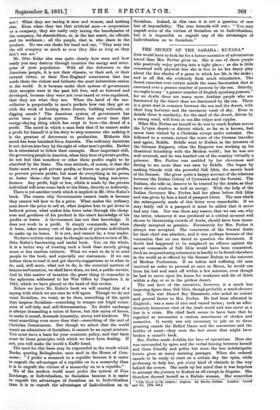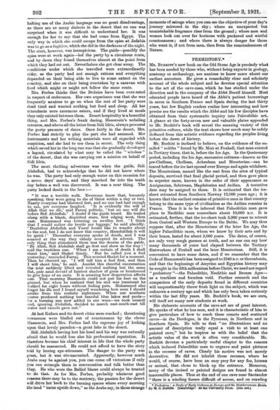THE SECRET OF THE SAHARA : KtFARA.*
ONE would have to look far for a better narrative of adventurous travel than Mrs. Forbes gives us. She is ono of those people who positively enjoy getting into a tight place ; as she is little concerned with physical fear she is free to let her fancy play about the fine shades of a game in which her life is the stake ; and in all this she evidently finds much stimulation. The desert exercises over certain minds the same fascination that is exercised over a greater number of persons by the sea. Strictly, we ought to say a greater number of English-speaking persons," for no doubt thero are many more Arabian people who are fascinated by the desert than are fascinated by the sea. There is a great deal in common between the sea and the desert, with their long horizons and the enormous vault of sky. Even in details there is similarity, for the sand of the desert, driven by a strong wind, will form in sea-like ridges and ripples.
What Mrs. Forbes set herself to do was to reach Kufara across the LiVan desert—a district which, so far as is known, had never been visited by a Christian except under restraint. She followed to a certain extent the route of the German traveller and agent, Rohlfs. Rohlfs went to Kufara in the interests of the German Emperor, when the Emperor was working up his theatrical friendship with the Moslem world ; but he was not well received, and ho was hustled out of the country virtually a prisoner. Mrs. Forbes was enabled by her cleverness and daring to see more than was seen by Rohlfs. She began by making friends with the powerful Sidi Idris, the ascetic head of the Senussi. She gives quite a happy account of the relations between the Italian Colony of Cyrenaica and the Senussi. The Italians, she tells us, deserve to be trusted by the Arabs, as they have shown wisdom as well as energy. With the help of the Italian Governor Mrs. Forbes laid her plans before Sidi Idris
and was given by him a kind of passport letter. The uses which she subsequently made of this letter were remarkable. If we may fairly call it a passport it must be added that it never had any visa. Nor was there any reason, that we can see, why the letter, whenever it was produced at a critical moment and shown to threatening crowds of Arabs, should have been imme- diately accepted as genuine. Fortunately for Mrs. Forbes it always was accepted. The veneration of the Sonussi Arabs for their chief was absolute, and it was perhaps because of this veneration that no one dared to question the document. If doubt had happened to be misplaced an offence against the sacred commands of Sidi Idris would have been committed. Such an unquestioning submission is hardly to be found elsewhere in the world as is offered by the Senussi Beduin to the autocrat of Moslem Puritanism. If an infirm and suffering old man received an order to proceed at once to Mecca, he would rise from his bed and start off within a few minutes, even though he had to move upon his knees for weakness and die of thirst within a day or so in the pitiless desert.
The real hero of the narrative, however, is a much less imposing figure than Sidi Idris, though probably a much cleverer man. This was Ahmed Bey Hassancin, who acted as courier and general factor to Mrs. Forbes. He had been educated in England ; was a man of nice and varied tastes ; took an affec- tionately humorous view of the Arab world and was never at a loss in a crisis. His chief fault seems to have been that he regarded as necessaries a curious assortment of clothes and cosmetics. It surely was not necessary to pile on to those groaning camels the Balliol blazer and the macaroons and the bottles of scent—they were the last straw that might have broken a camel's back.
Mrs. Forbes made Jedabia her base of operations. Here she was surrounded by spies, and the verbal fencing between herself and those friendly and polite but none the less indefatigable ferrets gives us many amusing passages. When she ordered camels to be ready to start on a certain day the spies, while professing to help her, put every kind of obstacle in the way behind the scenes. She made up her mind that it was hopeless to attempt the journey to Kufara at all except in disguise. She therefore dressed herself as a Beduin woman. Her somewhat
• The secret of the Sahara .Knfara. By Balite Forbes. London : Cassell and Co. Pas. net.)
halting use of the Arabic language was no great disadvantage, as there are so many dialects in the desert that no one was surprised when it was difficult to understand her. It was enough for her to say that she had come from Egypt. The only way in which she could escape from the spies at Jedabia was to go as a fugitive, which she did in the darkness of the night. The start, however, was inauspicious. The guide—possibly the spies were at work again—led the party by a circuitous route, and by dawn they found themselves almost at the point from which they had set out. Nevertheless she got clear away. The conditions under which she travelled were extraordinarily risky, as the party had not enough rations and everything depended on their being able to live to some extent on the country, and also on their being overtaken by a caravan with food which might or might not follow the same route.
Mrs. Forbes thinks that the Beduins have been over-rated in respect of endurance. Her own experience was that she was frequently anxious to go on when the rest of her party were dead tired and wanted nothing but food and sleep. All her attendants were enormous eaters, and if they lived at meals they only existed between them. Desert hospitality is a beautiful thing, and Mrs. Forbes's frank daring, Hassanein's unfailing resource, and above all the letter from Sidi Idris, always procured the party presents of dates. Once fairly in the desert, Mrs. Forbes had strictly to play the part she had assumed. Her instruments and her writing materials were all regarded with suspicion, and she had to use them in secret. The only thing which saved her in the long run was that she gradually developed a legend, circulated by what may be called the " wireless "
of the desert, that she was carrying out a mission on behalf of Sidi Idris.
The most thrilling adventure was when the guide, Sidi Abdullah, had to acknowledge that he did not know where he was. The. party had only enough water on this occasion for a seven. days' march, and they marched far into the tenth day before a well was discovered. It was a near thing. The party looked death in the face :—
" It was a terrible walk. Everyone knew that, humanly speaking, they were going to die of thirst within a day or two. Nearly, everyone had blistered feet, and no one had had enough to eat, yet everyone laughed. ` It is evidently the will of Allah that we die,' said Farraj politely, ' but no one will die before Sidi Abdullah.' I doubt if the guide heard. He trailed along with a blank, dispirited stare, first edging west, then oast. Mohammed was tottering on swollen feet. ` I think that I would rather die beside my luggage,' he said placidly. ' Doubtless Abdullah and Yusuf would like to wander about to the end, but I do not know this country, Hamdulillah it will be quick I ' Thereafter everyone spoke of death, and I was amazed at the way they calmly accepted its advent. The only thing that stimulated them was the demise of the guide. ` By Allah, Sidi Abdullah shall go first and show us the way ! ' said the toothless one. When I am certain of death I shall shoot him,' said Shakri firmly. ` But he called you a fool yesterday,' reminded Farraj. This worried Shakri for a moment. Then he cheered up. ` I will call him a fool first, and then I will shoot him,' he said. Amidst this cheerful conversation the mist suddenly lifted and revealed nothing but the same flat, pale sand devoid of faintest shadow of grass or brushwood to give hope of an oasis. It is amazing how desperation affects one. That morning Hassanein could not put his foot on the ground, but when he realized that his end was imminent he walked for eight hours without feeling pain. Mohammed also forgot his ills and I found myself wondering how soon I should awake from this realistic nightmare. When our southern course produced nothing but fanciful blue lakes and pools— for a burning sun now added to our woes—we took council and, ignoring Abdullah, decided to march east-south-east till water and camels gave out."
At last Kuf are and its desert cities were reached ; threatening townsmen were bluffed out of countenance by the clever Hassanein, and Mrs. Forbes had the supreme joy of looking upon that lovely paradox—a great lake in the desert.
Sidi. Abdullah having lost his head and his way was naturally afraid that he would lose also his professional reputation. It th,erefore became his chief interest in life that the whole party should be massacred. He could not afford to have the story told by leering eye-witnesses. The danger to the party was great, but it was circumvented. Apparently, however much Arabs may be against you, you can come off victorious if only you can entangle them in conversation and talk better than they. He who wore the Balliol blazer could always be trusted to do that. As for Mrs. Forbes, probably whatever good reasons. there• may be to the contrary, the passion for the desert will drive her back to the burning spaces where every morning the land " turns upside down," as the Arabs say, in those strange moments of mirage when you can see the objective of your day's journey mirrored in the sky ; where an unexpected but unmistakable fragrance rises from the ground ; where men and women look out over far horizons with puckered and wistful countenances ; and where there is always danger for those who want it, if not from men, then from the remorselessness of Nature.



































 Previous page
Previous page